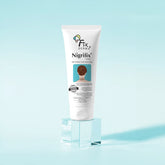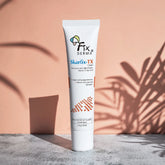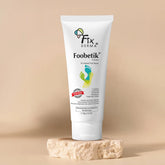How Does Stress Stimulate Hair Fall & Hair Thinning?

Table of Content
- How Stress Impacts Hair Health and What You Can Do About It
- How Stress Impacts Hair
- The hair growth cycle
- Common Causes of Stress-Induced Hair Loss: A Detailed Explanation
- Signs of Stress-Induced Hair Loss
- Love Your Locks: Hair Care Tips for Thin and Fragile Hair
- Preventing Stress- Stress-Related Hair Loss
- Conclusion: Reclaiming Your Hair and Confidence a Path to Recovery
- Frequently Asked Questions (FAQ’s)
🧑Stress can make your hair hit the snooze button! High levels of the stress hormone cortisol can push hair follicles into a resting phase (called telogen) too early, causing them to shed faster than they grow. It's like your hair saying, "I'm too stressed to deal with this right now!"
How Stress Impacts Hair Health and What You Can Do About It

Hair is seen as a crowning glory, symbolizing health, vitality, and personal identity. But for many, the experience of hair falling and thinning can be distressing. Among many factors that lead to hair loss one reason that is mainly highlighted is stress. So in this blog, we will understand the relationship between stress and hair loss, explore the biological mechanism behind it, what triggers hair loss, and what actionable steps can be taken to regain and maintain healthy hair.
How Stress Impacts Hair
Physical or emotional stress can directly impact overall health, including hair. Stress activates the body’s fight-or-flight response, releasing hormones like cortisol. Elevated cortisol levels interfere with the follicles' normal functioning, making the hair thin and causing shedding.
When stress becomes chronic, the hormones become imbalanced, disturbing the entire cycle. This condition can lead to telogen effluvium, a hormone that causes hair loss due to stress. Clearly understanding the effects of cortisol and stress is very important, as it will help to understand the root cause of stress, which leads to hair loss.
The hair growth cycle
To understand the stress and how it affects hair it is essential to understand the hair growth cycle:
- Anagen Phase: It is the growth phase lasting for several years
- Catagen Phase: It is a brief transitional phase.
- Telogen Phase: It is the resting phase where hair prepares to shed.
Under normal conditions most hair remains in the anagen phase, ensuring continuous growth. However, stress disturbs the cycles pushing the hair into the telogen phase. This condition is known as telogen effluvium which shows a noticeable hair fall within two or three months of a stressful event.
Cortisol and hair fall

Cortisol is often a stress hormone that is a key player in stress-induced hair loss. Chronic stress leads to several issues:
- Suppress the activity of hair follicle cells
- Extends the telogen phase
- Contribute to hair thinning and anxiety issues.
Many studies show that high cortisol levels can reduce the production of essential nutrients and proteins that are required for healthy hair to combat stress-related hair thinning.
Common Causes of Stress-Induced Hair Loss: A Detailed Explanation

Stress-induced hair loss usually takes place when mental, emotional, or physical stress disturbs the hair growth cycle. Stress can push the hair prematurely into the telogen phase. Which shows clearly the hair shedding and thinning. Let’s look at some most common causes of stress-induced hair loss in detail.
-
Emotional or Psychological Stress: Emotional stress can occur due to some challenging life-changing events like grief, work pressure, financial difficulties, or relationship issues.
How it affects hair: Chronic stress triggers the release of cortisol which is the primary stress hormone. Elevated levels of stress can hamper the follicle’s growth cycle by reducing the growth phase and pushing the follicles into resting mode called telogen effluvium -
Physical Stress or trauma: Physical stress comprises events or shocks that disrupt the internal balance such as illness, surgery, or childbirth.
How it affects hair: The body focuses on essential functions during physical stress by reducing the resources like nutrients and oxygen that are delivered to hair follicles. These issues cause excess hair loss. -
Nutritional Deficiencies Caused by Stress: Chronic stress leads to poor eating habits, malabsorption of nutrients, or deficiencies in key vitamins and minerals that are essential for hair growth.
How it affects hair: Hair follicles require specific nutrients such as biotin, zinc, iron, vitamin D, and essential protein for hair health. -
Hormonal Imbalance: Stress can hamper the hormone balance, especially in women where it impacts estrogen and progesterone levels.
How it affects hair: When cortisol level rises they interfere with a hormone that regulates growth with the help of hormones like estrogen and androgens. Hormonal imbalances lead to hair thinning and shedding especially in women. Stress can worsen the condition and can lead to conditions like androgenetic alopecia which is a hereditary form of hair loss.
Signs of Stress-Induced Hair Loss

Stress-induced hair loss occurs when emotional, physical, or psychological stress hampers your hair’s natural growth cycle. Understanding these signs in detail will help you get a detailed understanding of the issue to restore the hair’s health.
-
Increased hair shedding: You may notice an unusual amount of hair shedding especially while washing, combing, or running your hands through hair. Hair strands seem to fall more easily than usual.
What exactly happens: The shedding usually occurs due to a condition called Telogen Effluvium where stress pushes most percentage of hair into the rest phase causing premature shedding.
What to watch for:- Hair collecting in your shower drain
- Hair clumps on your pillow and hairbrush
- Sudden thinning of hair mainly in crown or temples
-
Thinning Hair: Hair may appear very thin or less than usual mainly around the scalp parting region on top of the head.
Why it happens: Stress interferes with the hair growth cycle shortening the anagen phase and increasing the telogen phase which causes the noticeable thinning of hair over time.
What to watch for:- Scalp visibility in areas that used to have full coverage
- Difficulty in styling due to lack of volume
- Hair feeling limp or lifeless.
-
Hair Breaking Off: Stress weakens the hair shaft making it more prone to breakage. This leads to shorter strands, uneven lengths, and rough texture.
Why it happens: Cortisol minimizes all the essential nutrients and proteins that are needed to maintain the hair strong, and healthy.
What to watch for:- Brittle hair that breaks when brushed or styled
- Frizz and splits end up becoming more noticeable
- Hair length not increasing.
-
Dry and Dull Hair: Hair may lose its natural shine and moisture which makes it appear dry, brittle, or even lifeless.
Why it happens: Stress diverts the nutrients and oxygen away from the hair follicles focusing more on vital organs making your hair undernourished.
What to watch for:- The hair looks dull and lacks vibrancy.
- Increased frizz and rough texture
- Difficulty in achieving a smooth and polished look
-
Slower Hair Growth: Hair may grow very slowly or may make your hair grow completely stalled.
Why it happens? Stress disturbs that hair’s growth phase by increasing the resting phase and slowing down the hair’s regeneration process.
What to watch for:- Less noticeable regrowth in areas where hair has shed
- Stagnation of hair length.
Love Your Locks: Hair Care Tips for Thin and Fragile Hair

Caring for health is very crucial and mainly for thin hair you need to be more vigilant. For healthy hair you need to have a proper nourishing routine that strengthens the strands, promotes scalp health, and minimizes breakage. Below is a step-by-step guide for an effective hair care routine tailored to your needs.
-
Cleanse Gently: Overwashing can strip the scalp’s natural oil whereas underwashing can block the hair follicles.
Steps:- Go for sulphate-free shampoo which is especially designed for thin hair. Look for ingredients that have biotin, niacin, or saw palmetto which supports hair growth.
- Massage your scalp gently to stimulate the blood flow and ensure shampoo reaches the root.
- Rinse thoroughly to avoid residue buildup.
-
Condition Lightly: Thin hair can get weighed down very easily, so opt for a lightweight conditioner that moisturizes without leaving any residue.
Steps:- Apply a conditioner to the mid-lengths and ends of your hair to avoid greasiness at the roots. Leave it for 2 or 3 minutes before rinsing it thoroughly.
-
Nourish your scalp: A good and healthy scalp is the foundation of strong hair growth.
Steps:- Use a scalp serum or treatment that comprises ingredients like caffeine, peppermint oil, or minoxidil. This helps stimulate the hair follicles and reduces the hair fall.
Recommended Product: Fixderma Anti-hair Fall Spray. Kairfoll Anti Hair Loss Lotion is a nourishing hair tonic enriched with multiple protein concentrates including soy and wheat germ extracts, amino acids, calcium pantothenate, and biotin. This lightweight serum perfectly gets absorbed into the scalp without leaving any residue, dryness, or irritation to the scalp.
- Use a scalp serum or treatment that comprises ingredients like caffeine, peppermint oil, or minoxidil. This helps stimulate the hair follicles and reduces the hair fall.
-
Use a Weekly hair mask: A hair mask provides you with deep hydration and strengthens your hair against breakage.
Step:- Apply a hair mask especially which is designed for thinning hair once a week.
- Leave it for 15-20 minutes before rinsing it properly.
- Keratin
- Aloe Vera
- Proteins
Apart from these ensure to minimize the heat and chemical damage, go for gentle detangling, and avoid harsh hair ties and styles, and mainly focus on nutrition.
Preventing Stress- Stress-Related Hair Loss

While the impact of stress and hair loss can feel overwhelming how it can be treated or handled efficiently so let’s look at a few steps to reduce stress the hair health.
- Manage Stress Effectively: Practice mindfulness, meditation, or yoga to manage the cortisol levels. Incorporate regular exercise to boost endorphins which counteract stress.
- Optimize your diet: A nutrient-rich diet supports hair health by supplying essential vitamins and minerals like botin, zinc, and iron. Omega-3 fatty acids are found in fish and flaxseeds which can help scalp health.
- Prioritize scalp care: Use gentle and sulphate-free shampoo and conditioner that nourishes the scalp. Regular scalp massage helps to circulate the blood for proper hair growth.
- Consult a professional: If the stress level persists for a long period then consult a dermatologist or trichologist. Treatments like minoxidil, PRP therapy, and stress management.
Conclusion: Reclaiming Your Hair and Confidence a Path to Recovery
The link between stress and hair loss is undeniable, but it’s a challenge that can be overcome with the right approach. By understanding how stress affects hair, especially through mechanisms like cortisol and hair fall, individuals can take proactive steps to reduce stress and restore hair health. Whether it's addressing telogen effluvium and stress, managing hair thinning and anxiety, or following practical hair loss recovery tips, a holistic approach is key.
Frequently Asked Questions (FAQ’s)
-
Can stress cause permanent hair thinning?
In most cases, stress-induced hair loss is temporary and resolves once the stress subsides. However, chronic stress can exacerbate conditions like androgenetic alopecia or cause prolonged thinning if left unaddressed. Early intervention and stress management are key to preventing permanent damage. -
Why does stress make my hair grow slower?
Stress diverts nutrients and energy from hair follicles to vital organs, slowing the hair growth phase (anagen). High levels of cortisol can also disrupt blood flow to the scalp, depriving follicles of oxygen and essential nutrients, and causing slower regrowth. -
What is the role of cortisol in stress-induced hair loss?
Cortisol, the stress hormone, weakens hair follicles by disrupting their growth cycle and causing collagen breakdown, which supports follicle health. Prolonged exposure to high cortisol levels can shrink follicles, contributing to thinning and shedding.








